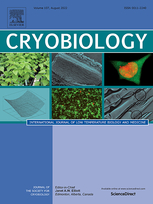
Greffes : les cellules souches hématopoïétiques humaines conservent leur aptitude au terme de 5 à 14 ans de cryoconservation.
Cryopreserved human haematopoietic stem cells retain engraftment potential after extended (5-14 years) cryostorage.
Auteurs : SPURR E. E., WIGGINS N. E., MARSDEN K. A., et al.
Type d'article : Article
Résumé
Harvesting of stem cells during the early phases of treatment with no immediate intention to perform a stem cell transplant is becoming increasingly common. Such "insurance" harvests are often stored for many years before being needed for transplant in a subsequent relapse. The effect of long-term cryostorage (5-14 years) on the viability and functional capacity of haematopoietic stem cells (HSCs) was investigated in 40 bone marrow and peripheral blood harvests using standard in vitro methods, the colony forming unit-granulocyte/macrophage (CFU-GM) assay and a single platform viable CD34+ cell absolute count by flow cytometry. It appears that HSC collections can remain adequate for safe transplantation after up to 14 years of cryostorage. However, as deterioration of HSC quality and viability may occur, some precautions may be warranted, i.e. harvesting higher than normal numbers of HSCs in collections intended for long-term storage and repeating in vitro assays after long-term storage prior to transplantation.
Détails
- Titre original : Cryopreserved human haematopoietic stem cells retain engraftment potential after extended (5-14 years) cryostorage.
- Identifiant de la fiche : 2003-2047
- Langues : Anglais
- Source : Cryobiology - vol. 44 - n. 3
- Date d'édition : 06/2002
Liens
Voir d'autres articles du même numéro (5)
Voir la source
Indexation
- Thèmes : Influence du froid sur les cellules, tissus et organes
- Mots-clés : Cryobiologie; Cellule; Homme; Greffe; Cryoconservation; Foie
-
Cryopreservation of adult human hepatocytes obt...
- Auteurs : ALEXANDRE E., VIOLLON-ABADIE C., DAVID P., et al.
- Date : 04/2002
- Langues : Anglais
- Source : Cryobiology - vol. 44 - n. 2
Voir la fiche
-
Cryopreservation of isolated human hepatocytes ...
- Auteurs : TERRY C., DHAWAN A., MITRY R. R., et al.
- Date : 10/2006
- Langues : Anglais
- Source : Cryobiology - vol. 53 - n. 2
Voir la fiche
-
Cryopreservation of hepatocytes: state of the art.
- Auteurs : AOKI T., KOIZUMI T., IZUMIDA Y., et al.
- Date : 03/2005
- Langues : Anglais
- Source : Low Temperature Medicine - vol. 31 - n. 1
- Formats : PDF
Voir la fiche
-
Conservation du foie et altération des cellules...
- Auteurs : TAKEI Y., KAWANO S., FUSAMOTO H., KAMADA T.
- Date : 07/1995
- Langues : Japonais
- Source : Low Temperature Medicine - vol. 21 - n. 1
Voir la fiche
-
Conservation au froid et altération due à la re...
- Auteurs : ARII S., IMAMURA M.
- Date : 07/1995
- Langues : Japonais
- Source : Low Temperature Medicine - vol. 21 - n. 1
Voir la fiche
